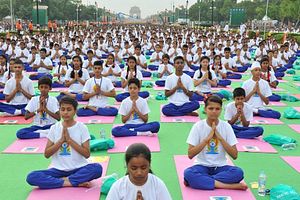On June 21, 2016, the world welcomed the second celebration of the International Day of Yoga – constituted last year by the United Nations through a Resolution that won the support of 177 member states (including India). In his message on Yoga Day, the United Nations Secretary General Ban Ki-moon declared the importance of promoting healthier lifestyles as part of the UN’s Sustainable Development Goals, which all member states adopted last year.
This emphasis on the ability of yoga to balance the mind and the body was echoed also in Indian Prime Minister Narendra Modi’s own address to the nation this year. Describing Yoga Day as a people’s movement of sorts, he declared that it was a healthy practice for both atheists and the religious, and the most inexpensive route to health. “At zero budget, nowhere in the world is one assured of health — but that is what Yoga gives you. Even the poorest of the poor can do this at ease and keep themselves healthy,” said Modi, reminding the gathering that no other day has received this kind of encouragement and speedy acceptance the world over.
Yoga day was celebrated all over the world, with people typically gathering in open public spaces for mass yoga demonstrations. In the Indian capital of New Delhi alone, over 15,000 people (including about 70 diplomats of 35 other nations), joined the demonstrations this year. The celebrations at Times Square and Sydney harbor have in particular gone viral on social media, which remained abuzz under the hastag #YogaDay
The International Day of Yoga 2016 did not, however, serve as merely a reminder of the importance of health and exercise – it also highlights the importance of yoga as India’s chief cultural export. For instance, spiritual leader and yoga practitioner Jaggi Vasudev declared at a panel discussion of India’s Permanent Mission to the UN that yoga was no longer just Indian, but rather India’s gift to the world, embraced with overwhelming enthusiasm and support.
External Affairs Minister Sushma Swaraj’s speech at the UN on the International Day of Yoga last year more explicitly emphasized the importance of yoga as a tool for unity and India’s soft power. “Yoga serves as a reminder of the potential for men and women to live in harmony with each other, as well as with nature, at a time when violent forces are threatening to destabilize society,” Swaraj said. “Yoga is an important antidote to such negativity — to move us on the path of peace.”
Modi, in a video posted on his own Twitter account ahead of Yoga Day 2016, said that he himself did not expect such unprecedented enthusiasm and declared that all participants of this celebration would be ambassadors who take forward “India’s ancient message to the world.”
Perhaps it is also important to ask how much the celebration of the world’s cheapest antidote to negativity and ill health has cost the Indian government this year. Last year, the cost of Yoga Day to the Ayush Ministry (the ministry in charge of organizing it) was estimated to be around $4.7 million. This year, the ministry supposedly dialed it back a little, with early estimates pegging costs at around $2.9 million, but this is excluding expenditures by individual states as well as the Ayush Ministry’s expenditure on security.
As analysts at The Diplomat have discussed earlier, the enthusiasm that the Modi government has shown for Yoga Day has not exactly been met with unanimous support within the country. Some groups are both skeptical about the monetary allocation toward the spread of yoga as well as the homogenization of what is now perceived as Indian culture. As yoga is increasingly being perceived as in important tool of Indian soft power, and as New Delhi continues to project it as a magnificently successful campaign to spread ancient Indian wisdom, these groups may yet have a point.

































